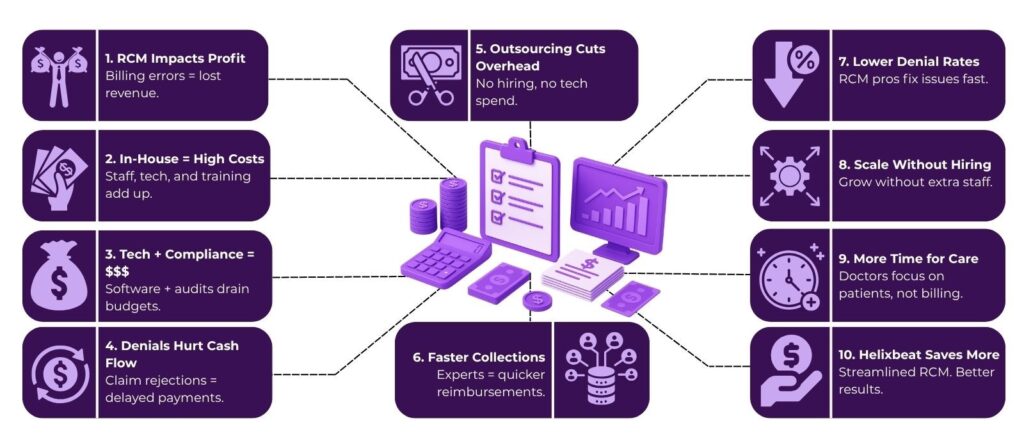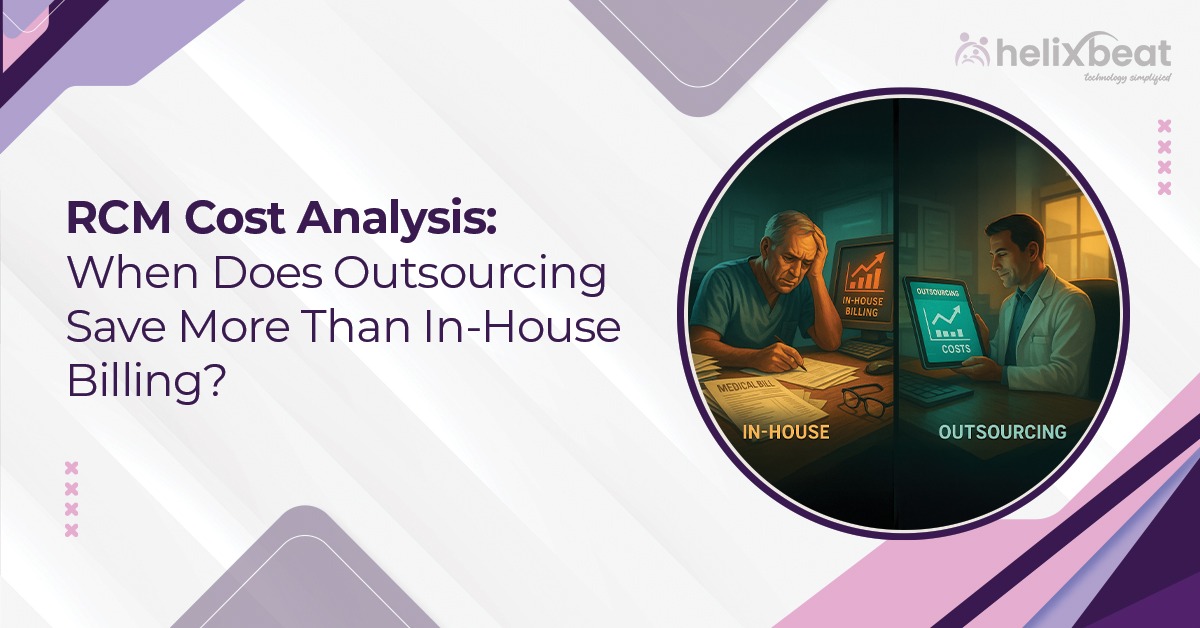In healthcare, managing the revenue cycle is as critical as delivering care. Every missed payment, coding error, or billing delay can cut into your bottom line. That’s why many healthcare providers find themselves weighing a fundamental question: Should we handle billing in-house, or is it smarter to outsource?
If you’re a hospital administrator, clinic owner, or practice manager, this decision can have a big impact on your profitability. In this blog, we dive deep into RCM cost analysis and help you pinpoint when Outsourcing Revenue Cycle Managment saves more than managing billing internally.

Table of Contents
What Is Revenue Cycle Management (RCM), and Why Does It Matter?
Revenue Cycle Management (RCM) covers the entire financial lifecycle of a patient—from the first appointment to the final payment. It involves:
- Patient registration and insurance verification
- Medical coding and charge capture
- Claims submission
- Payment posting
- Denial management and follow-ups
- Patient collections
RCM is complex, and even minor inefficiencies can pile up to become revenue leaks. That’s where the question of outsourcing versus in-house billing becomes relevant.
1. Staffing and Training Expenses
Hiring billing specialists, coders, and follow-up executives can be expensive. According to the Medical Group Management Association (MGMA), labor costs, including support staff salaries and benefits, typically account for approximately 25% of total practice revenue. When factoring in provider compensation, total labor expenses can account for 50% to 60% or more of operating costs in many practices.
2. Technology and Compliance
You’ll need robust software for medical billing, electronic health records (EHR), and clearinghouse connections. These tools require setup fees, subscriptions, and periodic updates—plus IT support.
HIPAA compliance audits and data security upgrades also come with a price tag. If anything falls short, the penalties can be costly.
3. Operational Inefficiencies
In-house billing is vulnerable to staff turnover, vacations, and burnout. During these periods, claim backlogs and delays can hurt cash flow.
4. Denial Management Challenges
Without specialized expertise, denial rates can rise. On average, hospitals lose 3-5% of their net revenue due to denied or underpaid claims.
Outsourcing Revenue Cycle Management: The Clear Advantage
When you outsource RCM, the provider undertakes all the responsibilities of an in-house team. This move not only cuts down on direct costs but also brings several key benefits.
1. Lower Overhead Costs
Outsourcing allows healthcare providers to reduce staffing and operational costs significantly. There’s no need to hire a large billing department, invest in software, or spend money on training. Most outsourcing firms operate on a percentage of collections model, which is more predictable and scalable.
2. Faster Claims Processing and Improved Cash Flow
Outsourcing firms specialize in streamlining billing and claims submission. They are equipped with the tools, knowledge, and expertise to quickly address issues such as claim denials, underpayments, and backlogs. As a result, outsourcing leads to faster reimbursement cycles and improved cash flow.
3. Expert Handling of Denials and Rejections
One of the biggest challenges in the healthcare industry is dealing with claim denials. According to industry data, the average denial rate for in-house billing is between 5% and 10%, with smaller practices experiencing even higher rates. Denial management requires expertise to identify the root cause, resolve issues, and resubmit claims quickly.
RCM firms are experts at denial management and typically achieve denial rates between 2% and 5%, saving healthcare providers significant amounts of money in unpaid claims.
4. Scalability and Flexibility
Outsourcing Revenue Cycle Managment allows healthcare providers to scale their operations efficiently without the constraints of hiring additional staff or investing in infrastructure. As patient volume fluctuates, outsourcing firms can adjust resources accordingly. This flexibility is especially useful for practices experiencing growth or seasonal surges.
5. More Time for Patient Care
One of the most overlooked benefits of outsourcing revenue cycle management is the time it frees up for healthcare providers. With billing and coding handled by experts, medical professionals can focus on what they do best—delivering high-quality patient care.
When Is Outsourcing Revenue Cycle Managment the Right Move?
While outsourcing RCM is beneficial for most healthcare organizations, there are some situations where it makes even more sense:
- Small to Mid-Sized Practices: For practices without the resources to hire a dedicated billing team, outsourcing is a cost-effective solution.
- High Claim Denials: If your practice is facing high claim denial rates, outsourcing can help reduce these rejections and improve revenue.
- Inconsistent Cash Flow: If your practice struggles with cash flow due to slow payments, outsourcing can streamline the billing process and speed up collections.
- Growth and Expansion: If your practice is growing, outsourcing gives you the flexibility to scale operations without increasing overhead costs.
Unlock Your Revenue Potential with Helixbeat
Helixbeat provides a comprehensive suite of services that streamline your revenue cycle management and prevent financial losses. Here’s how we can help:
1. Patient Registration & Eligibility Verification
By collecting precise data from the outset, we minimize the possibility of errors in billing, thereby making the entire process more efficient.
2. Medical Coding & Billing
Our expert coding services follow the latest coding standards (ICD-10-CM, CPT, HCPCS) to guarantee accurate and compliant claims submissions. This minimizes the risk of rejected claims and delays in reimbursement.
3. Claims Management
Helixbeat provides end-to-end claims submission and tracking services. We handle proactive follow-ups with payers, reducing the chance of missed payments or rejected claims. Our denial management strategies focus on maximizing reimbursements, helping healthcare organizations receive the revenue they’re entitled to.
4. Accounts Receivable (AR) Management
With our AR management, organizations can effectively manage outstanding claims and payments. By streamlining workflows and following up on overdue accounts, we help reduce aging balances and improve cash flow.
5. Denials Management
Our dedicated Denials Management team works to resolve denied claims quickly. They perform thorough root cause analysis, conduct proactive appeals, and track claims in real-time, all while maintaining compliance with industry standards. This helps to maximize reimbursements and minimize lost revenue.
6. Compliance & Regulatory Management
Helixbeat supports compliance with healthcare regulations, including HIPAA and payer contracts, by offering expert assistance, internal controls, and audits. This reduces the risk of non-compliance and ensures that your organization stays on top of industry standards and regulatory changes.
Final Thoughts
When it comes to the healthcare revenue cycle, outsourcing revenue cycle management is more than just a smart choice—it’s a game-changer. From reducing operational costs to speeding up claims processing and improving denial management, outsourcing offers substantial financial benefits.
At Helixbeat, we offer comprehensive RCM solutions to maximize your revenue, reduce denials, and provide the financial freedom your practice deserves. Talk to our experts and unlock your revenue potential.
FAQs
- What is outsourcing revenue cycle management?
Outsourcing revenue cycle management (RCM) refers to the practice of delegating all or parts of the financial management processes of a healthcare organization, such as billing, coding, claims processing, and payment collection, to a third-party service provider.
- What are the benefits of outsourcing revenue cycle management?
The key benefits include reduced overhead costs, improved denial management, faster claim reimbursements, access to RCM experts, and increased focus on patient care. It also provides the flexibility to scale operations without additional internal resources.
- Is outsourcing revenue cycle management suitable for small practices?
Yes, outsourcing RCM is particularly beneficial for small practices. It helps them save on staffing costs, gain access to experts without the need for large internal teams, and improve cash flow management without investing in expensive billing software.
- What types of healthcare organizations can benefit from outsourcing revenue cycle management?
Outsourcing RCM is beneficial for all types of healthcare organizations, including hospitals, clinics, physician practices, dental offices, and surgery centers. It helps organizations of any size streamline their financial operations and focus on providing better care.














